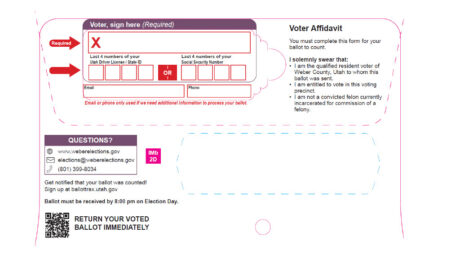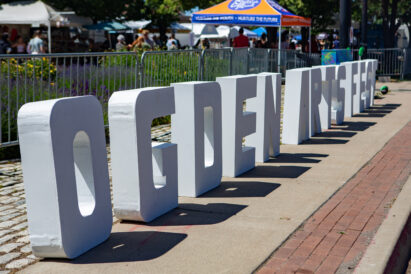Lovell attorney tells Utah Supreme Court his case has been ‘woefully underfunded’

Trent Nelson, The Salt Lake Tribune
Douglas Lovell attends an evidentiary hearing in Ogden on Monday, Aug. 5, 2019. A jury in 2015 sentenced Douglas Lovell to be executed for killing 39-year-old Joyce Yost in 1985. Lovell has been appealing the decision. At right is Lovell's attorney Colleen Coebergh.Attorneys for death row prisoner Douglas Lovell have told the Utah Supreme Court that his defense “was woefully underfunded at all stages and in all respects.”
Lovell, 64, was convicted in 2015 and sentenced to death for the 1985 murder of Joyce Yost. The South Ogden woman’s body was never found.
Lovell’s case is now back before the state’s high court in Salt Lake City after a four-year evidentiary review in Ogden’s 2nd District Court in which Judge Michael DiReda ruled Lovell’s trial counsel was not unconstitutionally deficient.
The appeal has involved arguments about Utah’s death penalty, and it has illuminated controversy about Weber County’s ongoing funding for public defenders and its compliance with the Sixth Amendment’s cited right to counsel for indigent defendants.
Lovell’s appeal attorneys argued before DiReda during hearings in 2019 that public defender Sean Young ineffectively represented him in his trial and sentencing. One key issue was whether Young failed to satisfactorily work to secure testimony of lay clergy with The Church of Jesus Christ of Latter-day Saints who visited Lovell during his imprisonment.
In the evidentiary hearings, attorney Colleen Coebergh presented testimony from numerous additional witnesses she said could have testified as character witnesses to Lovell’s claimed improvements while he had been on death row.
But DiReda ruled Young’s defense was not deficient and that some of the decisions he made for Lovell’s defense shielded the defendant from additional damaging testimony from witnesses.
On Jan. 12 this year, Coebergh filed an appeal document outlining the issues facing the Supreme Court. She asserted that both public defenders’ involvement in the 2015 trial should be scrutinized, both because Lovell was unhappy with the lead attorney and because the second attorney allegedly provided ineffective counsel.
She argued that the trial judge erred by allowing the Weber County Attorney’s Office to speak to defense funding issues and allowed it to improperly limit the assertion of mitigating circumstances in favor of Lovell.
“Mr. Lovell’s defense was woefully underfunded at all stages and in all respects,” Coebergh’s brief said. “The court permitted Weber County to have inappropriate hold of the purse strings, which resulted in an underfunded, ineffective defense.”
Even funding for the appellate process has been controversial.
In April 2021, Samuel P. Newton, Coebergh’s predecessor as death penalty attorney for Lovell, received $250,000 in an out-of-court settlement of the civil suit he filed alleging Weber County unfairly fired him after he publicly complained about miserly funding.
Coebergh challenged DiReda’s 168-page decision that analyzed the ineffective counsel matters.
She contended the ruling “was rife with error and ultimately unfair.” She based that conclusion on factors including DiReda’s ruling that she said “failed to challenge the state and the LDS Church’s interference with the case.”
She said DiReda should have ruled that defense attorney Young “failed to satisfactorily work to secure testimony of The Church of Jesus Christ of Latter-day Saints lay clergy who visited Lovell in prison.”
According to court records, the defense attorneys agreed with the church to limit the availability of those clergy for trial testimony. In the evidentiary hearings, Coebergh presented testimony from numerous additional witnesses she said could have testified as character witnesses to Lovell’s claimed improvements while he had been on death row.
Church lawyers working with the defense advised bishops who counseled Lovell on death row to avoid testifying about church policy. Several ecclesiastical personnel were considered by the defense to testify on Lovell’s behalf, but only two ended up testifying.
In the evidentiary hearing, DiReda pointed out, the two who testified said they knew they were not authorized to speak for the church or about church policy and doctrine. In addition, they testified the attorneys never tried to prevent them from testifying, never told them what to say and only advised them to tell the truth.
“Mr. Young did not perform deficiently for not objecting to non-existent interference,” DiReda wrote.
In her brief, Coebergh said Lovell’s case illustrates the death penalty is unconstitutional. “Mr. Lovell was not provided the resources to adequately defend his case,” she wrote. “He lacked qualified and competent counsel.”
She said Lovell “has never disputed that he killed Joyce Yost. His jury, however, was unable to hear highly persuasive evidence that he was a changed man — that he had incredible remorse for the crime and that he did all in his power to, at least to the best of his ability, to repay society for his wrong.” She said the death penalty was imposed as a “direct response” of ineffective counsel.
In documents responding to Coebergh’s brief, the Utah Attorney General’s Office said the 2015 verdict and sentence against Lovell was just. The AG’s office said prosecutors demonstrated “the egregiousness of Lovell’s conduct, his criminal history, that he does not tell the truth, and that he is manipulative and self-centered.”
The AG said evidence also showed Lovell’s actions involving Yost included aggravated sexual assault, forcible sodomy, conspiracy to commit murder, witness tampering and solicitation to commit murder.
Prosecutors said Lovell killed Yost to prevent her from testifying that he raped her.
The Supreme Court has not set a hearing date for Lovell’s appeal.



